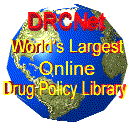 | ||
| |
by CBC News (19 Nov, 2007)
Cannabis cures cancer - how many more studies are needed?
 |
| More and more studies prove cannabis fights cancer |
"Right now we have a limited range of options in treating aggressive forms of cancer. Those treatments, such as chemotherapy, can be effective but they can also be extremely toxic and difficult for patients," said researcher Dr. Sean McAllister in a release. "This compound offers the hope of a non-toxic therapy that could achieve the same results without any of the painful side effects."
CBD works by blocking the activity of gene Id-1, which is associated with metastasis -- the spread of cancer cells away from the original tumor site. The compound does not share marijuana's psychoactive properties.
"We know that Id-1 is a key regulator of the spread of breast cancer," said senior author Dr. Pierre-Yves Desprez in a release. "We also know that Id-1 has also been found at higher levels in other forms of cancer. So what is exciting about this study is that if CBD can inhibit Id-1 in breast cancer cells, then it may also prove effective at stopping the spread of cancer cells in other forms of the disease, such as colon and brain or prostate cancer."
Researchers stressed that they were not encouraging cancer patients to smoke pot, adding that it would be highly unlikely for patients to receive an effective concentration of the compound in that way. The team's findings were published in the journal Molecular Cancer Therapeutics.
-Article from CBC.ca
Cannabis and Cancer Studies from SafeAccess.ca: safeaccess.ca/research/cancer.htm
Previous CC Magazine articles about cannabis and cancer studies
THC for Tumors
March, 1999
US Federal Report Backs Medical Pot
May, 1999
Cannabinoid Research Around The World
July, 1999
THC Destroys Brain Cancers
May, 2000
Pot Shrinks Tumors
June, 2000
THC-Tumor Research Funding Cut
February, 2001
Cannabinoid Treats Tumors
January, 2002
Cannabinoid Anti-Tumor Effect
July, 2003
Cannabinoids Destroy Cancer
February, 2004
Study Finds No Lung Cancer-Marijuana Connection
May, 2006 - Washington Post
THC May Fight Lung Cancer
April, 2007
 |
| Cannabis for the healing of the nations |
From California Pacific Medical Center
Our research team is studying the potential of the endocannabinoid system to control cell fate with the goal of developing therapeutic interventions for aggressive cancers. This newly discovered biological system can be regulated by many different classes of cannabinoid compounds that work through specific cellular receptors. The cloned cannabinoid receptors have been termed cannabinoid 1 (CB1) and (CB2).
Delta-9 THC (Δ9-tetrahydrocannabinol), a mixed CB1 and CB2 receptor agonist, is the primary active constituent of Cannabis sativa and is currently being used in a clinical trial for the treatment of aggressive recurrent glioblastoma multiforme (GBM).
Cannabinoids are also being used in clinical trials for purposes unrelated to their direct anticancer activity. The compounds have been reported to be well tolerated during chronic oral and systemic administration.
In addition to Δ9-THC, cannabidiol (CBD), cannabinol (CBN) and cannabigerol (CBG) are also present in reasonable quantities in Cannabis. CBN has low affinity for CB1 and CB2 receptors, whereas the non-psychotropic cannabinoids, CBD and CBG, have negligible affinity for the cloned receptors. We have determined that these additional cannabinoids are also effective and inhibiting aggressive cancers. Importantly, we have discovered in vitro that a synergistic increase in the antiproliferative and apoptotic activity of cannabinoids can be produced by combining specific ratios of CB1 and CB2 receptors agonists with non-psychotropic cannabinoids.
We are currently determining the molecular mechanism that may explain the synergistic increase in anticancer activity that is observed with the combination treatments. We are also studying whether this combination strategy will lead to greater antitumor activity in vivo.
In addition to the combination therapy project, we are working in collaboration with Dr. Pierre Desprez to develop novel inhibitors of Id-1 using cannabinoid compounds. Id-1 is a helix-loop-helix protein that acts as an inhibitor of basic helix-loop-helix transcription factors that control cell differentiation, development and carcinogenesis. Past research of Id-1 expression in normal and cancerous breast cells, as well as in mouse mammary glands and in human breast cancer biopsies, demonstrated that increased Id-1 expression was associated with a proliferative and invasive phenotype. Specifically, it was found that Id-1 was constitutively expressed at a high level in aggressive breast cancer cells and human biopsies, and that aggressiveness was reverted in vitro and in vivo when Id-1 expression was targeted using antisense technology.
Importantly, we have recently discovered that CBD, a nontoxic cannabinoid that lacks psychoactivity, can inhibit Id-1 gene expression in metastatic breast cancer cells and consequently their aggressive phenotype. The down-regulation of expression was the result of the inhibition of the endogenous Id-1 promoter and corresponding mRNA and protein levels. CBD and compounds based off of its structure can therefore potentially be used as therapeutic agents. CBD also inhibits breast cancer metastasis in vivo.
Based off of our recent findings, we are currently involved in 1) developing novel CBD analogs for the treat of aggressive breast cancers 2) discovering the detailed mechanisms through which cannabinoid compounds regulate Id-1 expression.























No comments:
Post a Comment